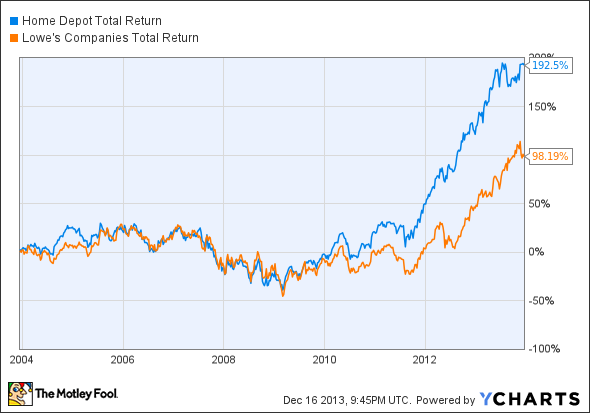You might not realize it, but companies go to extreme lengths to make sure that your shopping experience is more than satisfactory. In today's competitive retail landscape, there is no other choice. If a retailer doesn't please its shoppers, those shoppers will choose another store ... and there are plenty of other options to choose from.
Amazon's (AMZN 0.58%) founder and CEO, Jeff Bezos, built his company on the belief that if you go to great lengths to take care of your customers, then those customers will become loyal to you. From there, Amazon has built out its product and service offerings to those customers. This has been a successful game plan, and the stock is up over 130% over the past three years. However, the title of "Most Trusted Big-Box Retailer" might belong to Best Buy (NYSE: BBY), Target (NYSE: TGT), Lowe's (NYSE: LOW), or Home Depot (NYSE: HD). Let's find out.
Metrics used
The following results are based on a study done by Forrester Research. Forrester Research used many key metrics to determine which big-box retailers were the most trusted by consumers. These metrics included emotional connection, customer service, conversation-creating capability, differentiation, and pricing power. The latter pertains to a company's ability to charge more for the same product being sold down the road.
With these metrics in mind, which three big-box retailers make the list?
No surprise at No. 1
The aforementioned Amazon comes in at the top of the list. According to Forrester Research, Amazon is the most trusted big-box retailer in the world. Yes, Forrester Research puts Amazon in the big-box retailer category, which makes sense considering that it offers products similar to those offered by Wal-Mart or Target, just that this all takes place online.
Amazon is trading at an extremely high multiple of 145 times forward earnings, and it only has a profit margin of 0.19%. This concerns many investors, and rightfully so. At the same time, Amazon should be capable of growing into its multiple.
One of the interesting trends in the study was that 45% of Millennials shop online at least once per week, compared to just 29% of American adults on average. Therefore, it's highly likely that online shopping will continue to increase in the future. As the top online retailer, the math works out well for Amazon.
We'll get back to Amazon in a moment, including a remarkable chart that says a lot. For now, let's see what big-box companies came in second through fifth for consumer trust.
No. 2 and No. 3
Lowe's and Home Depot came in at No. 2 and No. 3, respectively. However, they reached their positions of second and third in very different ways.
Lowe's is most popular among Baby Boomers. The company's slogan of "Never Stop Improving" seems to be effective, but at the same time, that slogan doesn't appeal to most Millennials. That's because most Millennials are cautious spenders.
For now, Lowe's should continue to perform well, driving foot traffic from a wealthy generation (Baby Boomers), some of which look at home improvement as a hobby. Some of these Baby Boomers attempt to improve their homes every weekend. This is all good news for Lowe's, but if it wants to steal market share from Home Depot in the future, then it might want to alter its slogan.
Home Depot attracts more Millennials. Its slogan: "More Saving, More Doing" targets consumers who want to save money and are looking for the best bargains. The slogan is also truthful. Home Depot offers varying price points on a broad range of products. From an investing standpoint, Home Depot has outperformed Lowe's over the past decade on total shareholder return (stock appreciation + dividend payments):
HD Total Return Price data by YCharts
Currently, Home Depot also yields 2%, whereas Lowe's yields 1.50%. They're both strong companies, but Home Depot looks to hold a slight edge. Now let's see what other two companies make the list.
No. 4 and No. 5
If you're wondering about what big-box retailers came in fourth and fifth place for most trusted by consumers, they would be Target and Best Buy. Target should come as no surprise given its low prices combined with a very clean and comfortable atmosphere. Best Buy might surprise you; it surprised me. Perhaps Best Buy deserves more credit than it receives, but due to all of the competition it's up against and its inability to deliver consistent profits, I can't jump on the Best Buy bandwagon.
About that telling chart....
Any company making this list has at least some potential going forward. While past results don't indicate future success, they can be a good indicator. As is often said on Wall Street, the winners keep winning. With that in mind, take a gander at the revenue comparison for the companies mentioned in this article over the past five years. One company clearly stands out:
AMZN Revenue (TTM) data by YCharts
Relentless top-line growth
If you want to invest in a strong company that pays a decent dividend, then consider Home Depot, Lowe's, or Target. If you're looking to invest in a potential turnaround play, then you might want to consider Best Buy, but this is high risk. I'm not a big fan, at least not until the company delivers consistent profits. If you want to invest in strong top-line growth potential and you're willing to pay a steep premium, then Amazon might be for you.







